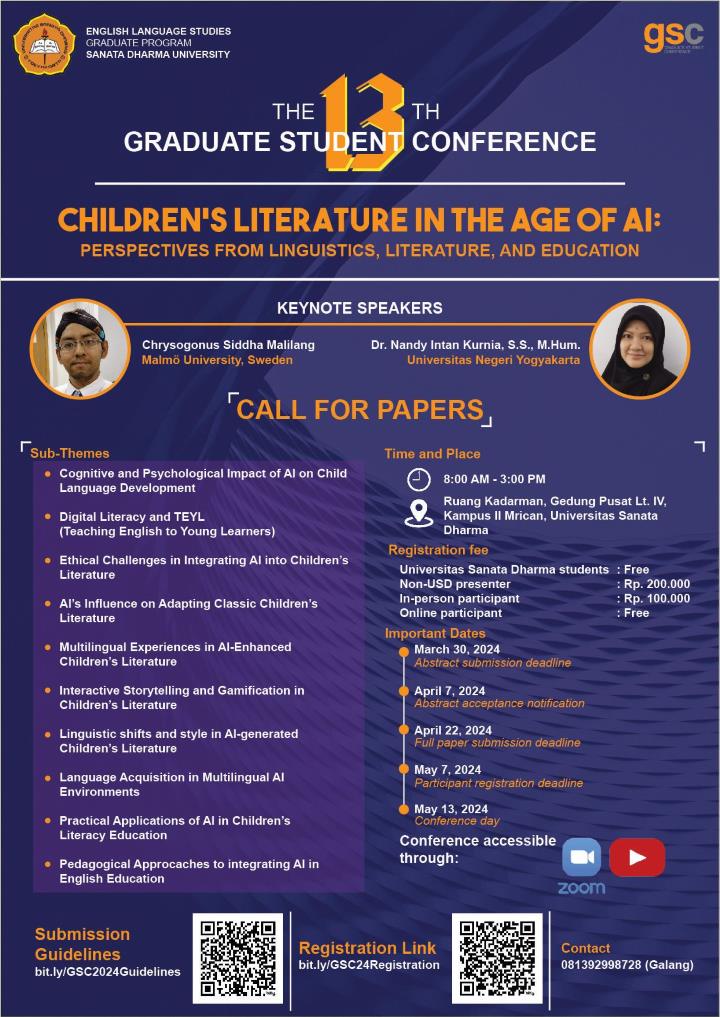May 13, 2024

(Vol. 13, 2024)
Introduction
In today's world, children are growing up surrounded by technology and artificial intelligence (AI). Understanding how AI affects their experience with literature is crucial for educators, parents, and researchers. Children's literature plays a big role in helping children learn to read, so it's even more important in this tech-filled environment. As AI becomes more common in schools, it's crucial to see how it can help children learn and be creative, especially in the context of children's literature. This focus gives educators a chance to discuss new and effective ways to use technology in a changing educational landscape.
Integrating AI into children's literature raises ethical questions, like privacy and its impact on children's thinking and emotions. AI also has the potential to make children more engaged and make literature more accessible. Studying these possibilities helps educators and researchers find ways to create interesting and inclusive reading experiences that work for all children. Examining these issues from different perspectives—linguistic, literary, and educational—helps address concerns and find balanced solutions. Looking ahead, the conference theme considers the future of children's literature in the AI age. Encouraging collaboration between linguists, literary scholars, and educators is key. Working together helps us fully understand how children's literature and AI connect. Children's literature is a worldwide thing, and AI affects societies globally. The conference, built around this theme, creates a vital space for an international conversation, letting people share their diverse views and experiences.
Purpose and Objectives
The objectives of implementing this activity include the following.
- Foster understanding and exploration of the impact of AI on children's literature, aiming to enhance literacy practices and address ethical considerations.
- Encourage interdisciplinary collaboration, shape the future of children's literature in the AI age, and inspire innovative solutions that promote both technological literacy and a love for reading.
Theme and Sub-Themes
“Children Literature in the Age of AI: Perspectives from Linguistics, Literature, and Education” will cover a range of themes, including, but not limited to:
- AI’s Impact on Child Language Development in Literature
- Digital Literacy and English Education for Children
- The Potential of AI in Crafting Interactive Children’s Stories
- Ethical Challenges in Integrating AI into Children’s Literature
- Multilingual Experiences in AI-Enhanced Children’s Stories
- Practical Applications of AI in Children’s Literacy Education
- Cognitive and Emotional Effects of AI in Children’s Reading
- AI’s Influence on Adapting Classic Children’s Literature
- Ensuring Inclusivity in AI-Driven Narratives for Children
- Pedagogical Innovations: AI Integration in Children’s Literature Education
Call for Full Paper Procedure
- Presenters are requested to submit a full-paper draft.
- Presenters (both individual and team) can only submit one paper.
- Selected papers will be published in Graduate Students Conference 2024 Proceedings and International Journal of English Language Studies (IJELS) (Optional)
- Submission guidelines: https://bit.ly/GSC2024Guidelines
Important Dates
● Abstract submission deadline : March 30, 2024
● Abstract acceptance notification : April 7, 2024
● Full paper submission deadline : April 22, 2024
● Participant registration deadline : May 7, 2024
● Conference day : May 13, 2024
Contribution of Conference Participants:
- Universitas Sanata Dharma (USD) students : free
- Non-USD presenter : Rp. 200.000,-
- In-person participant : Rp. 100.000,-
- Online participant : free
For Regustration

Transferring
Bank Account: BCA 8465828435 a/n Ucca Diandra Tantra Baswara
Contact Person
Stefanus Galang Ardana : 081392998728
Stanislaus Bayu Kusuma : 085894285584

Conference Information
- » Overview
- » Program
- » Presentations
- » Conference Schedule
- » Registration
- » Timeline

